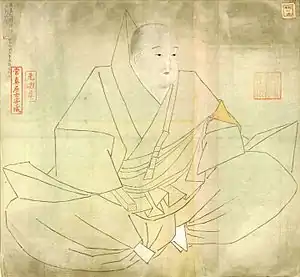1129
Year 1129 (MCXXIX) was a common year starting on Tuesday (link will display the full calendar) of the Julian calendar.
| Millennium: | 2nd millennium |
|---|---|
| Centuries: | |
| Decades: | |
| Years: |
| 1129 by topic |
|---|
| Leaders |
|
| Birth and death categories |
| Births – Deaths |
| Establishments and disestablishments categories |
| Establishments – Disestablishments |
| Art and literature |
| 1129 in poetry |
| Gregorian calendar | 1129 MCXXIX |
| Ab urbe condita | 1882 |
| Armenian calendar | 578 ԹՎ ՇՀԸ |
| Assyrian calendar | 5879 |
| Balinese saka calendar | 1050–1051 |
| Bengali calendar | 536 |
| Berber calendar | 2079 |
| English Regnal year | 29 Hen. 1 – 30 Hen. 1 |
| Buddhist calendar | 1673 |
| Burmese calendar | 491 |
| Byzantine calendar | 6637–6638 |
| Chinese calendar | 戊申年 (Earth Monkey) 3825 or 3765 — to — 己酉年 (Earth Rooster) 3826 or 3766 |
| Coptic calendar | 845–846 |
| Discordian calendar | 2295 |
| Ethiopian calendar | 1121–1122 |
| Hebrew calendar | 4889–4890 |
| Hindu calendars | |
| - Vikram Samvat | 1185–1186 |
| - Shaka Samvat | 1050–1051 |
| - Kali Yuga | 4229–4230 |
| Holocene calendar | 11129 |
| Igbo calendar | 129–130 |
| Iranian calendar | 507–508 |
| Islamic calendar | 523–524 |
| Japanese calendar | Daiji 4 (大治4年) |
| Javanese calendar | 1034–1035 |
| Julian calendar | 1129 MCXXIX |
| Korean calendar | 3462 |
| Minguo calendar | 783 before ROC 民前783年 |
| Nanakshahi calendar | −339 |
| Seleucid era | 1440/1441 AG |
| Thai solar calendar | 1671–1672 |
| Tibetan calendar | 阳土猴年 (male Earth-Monkey) 1255 or 874 or 102 — to — 阴土鸡年 (female Earth-Rooster) 1256 or 875 or 103 |

Emperor Shirakawa (1073-1087)
Events
Europe
- April 14 – Following the Capetian tradition, King Louis VI (the Fat) has his eldest son Philip crowned as co-ruler of France at Rheims Cathedral. Louis himself becomes the national protector of all France.
- June 2 – Fulk V, count of Anjou, marries Melisende (daughter of King Baldwin II) the heir to the Kingdom of Jerusalem. Fulk gives up his title which passes to his 15-year-old son, Geoffrey V (the Fair).
- September – Roger II of Sicily gains recognition as duke at Melfi from the Norman nobles of Naples, Bari, Capua, Salerno and other cities that have resisted him.
- Burgsteinfurt Castle is built in what is now Steinfurt (modern Germany).
Asia
- Jin–Song War: Emperor Gao Zong of the Song Dynasty moves the capital from Yangzhou to Hangzhou, after the Jurchen Jin Dynasty captures Kaifeng in the Jingkang Incident.
- March 26 – Gao Zong abdicates the throne after a mutiny of the palace guard. His 2-year-old son Zhao Fu succeeds him, but Empress Meng becomes regent and the sole ruler.
- April 20 – Gao Zong regains the throne (with the support of the imperial army led by General Han Shizhong). Zhao Fu is forced the abdicate with Meng having ruled for 25 days.
- July 24 – Former Emperor Shirakawa dies at his native Kyoto. His son Toba begins his cloistered rule, sharing power with Sutoku, a grandson of Shirakawa.
Religion
- January 23 – Henry of Blois becomes bishop of Winchester after the death of William Giffard (who was also Lord Chancellor to King Henry I) in England.
Births
- Abu al-Abbas as-Sabti, Moroccan Sufi writer (d. 1204)
- Date Tomomune, Japanese nobleman and samurai (d. 1199)
- Elisabeth of Schönau, German Benedictine abbess (d. 1164)
- Henry the Lion, duke of Saxony and Bavaria (d. 1195)
- Theophanes Kerameus, bishop of Rossano (d. 1152)
Deaths
- January 23 – William Giffard, bishop of Winchester
- January 27 – Ranulf le Meschin, 3rd Earl of Chester (b. 1070)[1]
- January 29 – Minamoto no Shunrai, Japanese poet (b. 1055)
- February 16 – Thoros I, Armenian prince (or 1130)
- February 17 – Constantine II, Armenian prince
- July 24 – Shirakawa, emperor of Japan (b. 1053)
- July 28 – Zhao Fu, emperor of the Song Dynasty (b. 1127)
- November 21 – Nigel d'Aubigny, Norman nobleman
- December 30 – Roger of Cannae, Italian bishop (b. 1060)
- Athanasius VI bar Khamoro, patriarch of Antioch
- Cellach of Armagh (or Celsus), Irish archbishop (b. 1080)
- Fujiwara no Akinaka, Japanese nobleman (b. 1059)
- John Theristus, Italian Benedictine monk (b. 1049)
- Ramiro Sánchez, Spanish nobleman (or 1130)
- Richard Fitz Pons, Norman nobleman (b. 1080)
- Walter FitzRoger, Norman sheriff of Gloucester
- Zhao Mingcheng, Chinese politician (b. 1081)
References
- Hammond, Peter W., ed. (1998), The Complete Peerage; or, A history of the House of lords and all its members from the earliest times, vol. XIV: Addenda & Corrigenda, Stroud: Sutton Publishing, p. 170, ISBN 978-0-904387-82-7, retrieved May 21, 2019
This article is issued from Wikipedia. The text is licensed under Creative Commons - Attribution - Sharealike. Additional terms may apply for the media files.